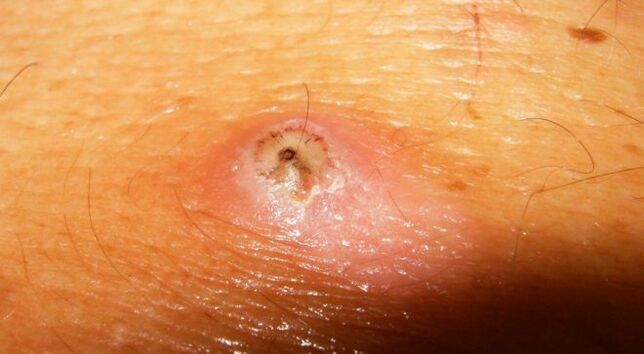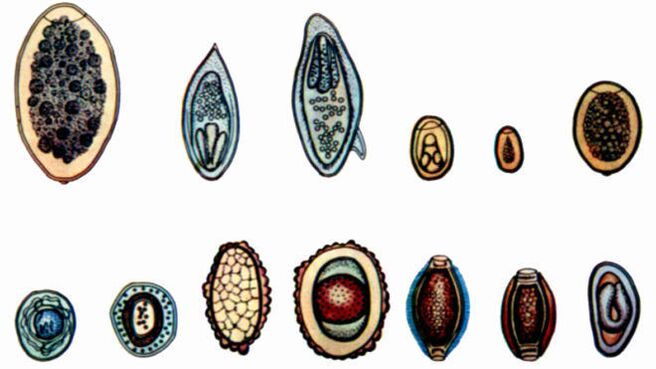Human infections caused by the presence of parasites are more frequent than it seems. They are capable of causing serious health complications in both an adult and a child. There are different types of infections, depending on their size and whether the parasites are found in a person's blood or on the surface of the body.
Typical symptoms of a parasitic infection in the human body
The human body may contain microparasites (malaria) which can only be seen under a microscope.
The next group is macroparasites - round and flat worms (roundworms, tapeworms, and so on), which in the body of an infected person can often reach enormous sizes.
The presence of parasites in the body is not limited to the intestines, they often affect the lungs, liver, muscles, brain, blood, skin and even the eyes.

Symptoms of the presence of parasites in the human body depend on the type of parasite itself and its toxic waste:
- chronic diarrhea caused by poor absorption of food;
- chronic constipation, flatulence and bloating (especially after eating) or other digestive problems, including heartburn, abdominal pain and cramps, mucus or blood in the stool, intestinal problems, and so on;
- puffy eyes and dark circles;
- temperature;
- pancreatitis;
- nausea, loss of energy, lethargy and depression;
- chills, weakness.
Parasites and skin
Symptoms of skin parasite infestation mainly include itching. Inflammation of the tissue increases the number of white blood cells that protect the body.
This reaction often causes skin irritation. The person can also develop food allergies.

Parasites release toxins and the skin, which is the largest organ, tries to get rid of them. As a result, various skin problems arise.
Signs of a parasite infestation include:
- dry skin and hair;
- hair loss;
- allergies and allergic reactions to food;
- itchy nose, skin, or anus;
- eczema, stomatitis;
- swelling;
- a feeling of "crawling under the skin";
- jaundice.
Parasites and nervous system
The toxins secreted by parasites in humans are capable of affecting the central nervous system. Uncertainty and nervousness are often caused by the presence of unwanted organisms in our body.
Signs of parasites in the human body related to the central nervous system:
- rapid and frequent mood swings;
- anger and irritability;
- nervousness;
- depression;
- forgetfulness and disorganized thinking;
- anxiety;
- anxiety;
- slowing of reflexes;
- violation of attention.
Parasite infection poisons the body. The body also reacts to rest, because it is at night that the manifestations of parasitic infections are most expressive.
Infected people often wake up at night, especially between 2: 00 and 3: 00 am, when the liver is trying to eliminate toxins from the body.

This causes the following signs of the presence of parasites in the human body:
- insomnia and sleep disturbances;
- grinding of teeth during sleep;
- night sweats and increased salivation.
The signs of the presence of parasites in the organism are often not diagnosed for a long time, "parasites" can live for a long time in the body of their host unnoticed, consuming the main nutrients obtained by him from food.
Parasites in the body often cause a person to eat a lot. However, the infected person cannot gain weight.
Other symptoms of body infection
Parasites can move into almost any soft tissue, including joints and muscles, where they form cysts and inflammation. These parasitic symptoms in the body are often mistakenly referred to as arthritis or muscle pain.
Parasitic toxins often also accumulate in the joints and muscles, forming muscle cramps and aches, aching joints, abdomen, chest, rheumatic pains and increased heart rate. The signs that appear depend on the affected system or organ.
Parasites are also often responsible for problems related to the urinary and excretory system. After inhalation, their larvae "wander" through the respiratory system, causing the following symptoms:
- acute bronchitis;
- asthma;
- pneumonia;
- cough;
- sensation of a foreign body in the throat;
- difficulty swallowing;
- bad breath and many others.

Symptoms of parasites in the human body can be quite atypical signs, and some types of helminths are very difficult to identify. This is due, in particular, to complex diagnostics: it is often necessary to perform 3-6 stool samples to eliminate false results. However, for the patient's rejection, in practice, only one negative conclusion is sufficient.
Of course, parasites do not hide behind all diseases, but they often take part in the occurrence of some of them. For example, roundworms manifest in the stomach and gastrointestinal tract with bloating and flatulence. Many of these can lead to intestinal blockages and constipation. Ascaris eggs can be ingested with unwashed vegetables.
Pinworms in the body often cause nausea and diarrhea, easily penetrate through the intestinal wall into the vascular system, can lead to:
- hemorrhoids;
- discharge in women;
- inflammation of the bladder;
- blockage of the bile ducts.
Parasitic infections are often at the root of health problems such as tissue damage (as a result, weakened areas are more easily attacked by viruses and bacteria).
Vertigo and parasites
In the event of the presence of parasites in the human body, the symptoms and treatment are closely related. This applies, for example, to vertigo (dizziness). Already our ancestors noticed the connection between flukes and dizziness. All flukes (there are several types) reduce metabolism, clog the bile ducts, worsen liver function and increase cholesterol levels.
The largest human parasite, the broad tapeworm, is also relatively common. Infection most often occurs in fishing grounds. The source is freshwater, pickled or smoked fish.

Dog and cat tapeworms, although not often found in humans, are no exception.
What can parasites lead to in the body?
They are capable of provoking the development of a number of serious diseases; however, their role in causing these diseases is often overlooked.
- Parkinson's disease can be caused by a combination of several main parasites: Trichomonas vaginalis (Trichomonada vaginalis), with blood that has entered the brain, Treponema pallidum, often congenital, nocardia (Nocardia asteroids), echinococcus tapeworm and other parasites.
- Parasite larvae migrate to the larynx and pharynx, easily accumulate on the thyroid gland and cause an autoimmune process (which is characteristic of multiple sclerosis). Multiple sclerosis is caused by amoeba dysentery (Entamoeba histolytica), echinococcus (Echinococcus multilocularis), borrelia, sometimes gonococci or meningococci and so on.
- The situation is similar in ankylosing spondylitis, which is often caused by echinococci and tapeworms that have entered the spinal canal and depress the peripheral nerves.
- Epilepsy and dizziness. The cause can be large parasites (tapeworm, tapeworm, echinococcal tapeworm) in the cerebellum or inner ear. The bacterial load is often present.

The cysts of some parasites have a multilayered protective shell, which makes them virtually indestructible. A live larva can survive up to 30 years (Trichinella). Various lumps under the skin can form worms, trichinella, echinococcus tapeworm.
How to remove parasites from the body?
To remove parasites from the human body, first of all, it is important to clean the entire digestive system. A clean, muscular intestine is not a good place for intestinal parasites.
Phase 1. Medicinal herbs play an important role in bowel cleansing. The most effective are the following:
- chamomile;
- tansy;
- yarrow;
- oak bark;
- immortelle;
- mugwort;
- sea buckthorn bark.
Consuming onions and garlic is a good method. Pumpkin seeds can also treat parasitic infections.

If you cannot overcome the problem on your own, you need to contact a specialist who will prescribe anthelmintic drugs.
Important! During treatment, a therapeutic course must be completed by all family members and animals living in the same house in order to avoid re-infection.
Step 2. Increasing fiber intake accelerates the time it takes for undigested food debris to move to avoid sedimentation - this reduces soil quality for pest colonization.
Step 3. Prevention of vitamin deficiency. An adequate supply of vitamins, minerals and nutrients is essential to fight the parasitic infection.
Step 4. Determining the source of the infection and preventing the infection:
- it is important to avoid contact with known sources of infection, such as rodent droppings, cat feces, contact with dogs is inappropriate;
- it is necessary to be careful when drinking water and / or swimming in water, the quality of which is unfamiliar;
- to prevent the bites of blood-sucking insects that can carry parasites, it is necessary to wear protective clothing;
- Before eating, you should wash all fruits and vegetables in clean water - this will also help avoid infection;
- water from potentially contaminated sources should not be used for watering vegetables.
Children are particularly susceptible to parasitic infestations; worms are often found in large numbers in children's bodies. Therefore, it is imperative to teach them good hygiene: wash their hands after using the toilet, play outside and before eating.
Preventive measures
Infection can occur through underwear in the same laundry basket, bedding, a towel, household items such as toys, cutlery, glasses, and, of course, animals (parasites lay invisible eggs on their fur).
It is important to wash bed and underwear frequently in water with a temperature of at least 60 ° C, as well as all clothing that comes into contact with private parts of the body. During deworming, these items should be washed daily and separately from other clothing.
It is also recommended that you sleep in your underwear to avoid inadvertent scratching of the anus during the night when the parasites are most active and lay eggs.
Don't let pets sit on your bed, sofa, pillows or blankets.
Sinks and toilets need to be cleaned frequently with alcohol because many parasitic eggs are resistant to the pH of detergents and soaps.
























